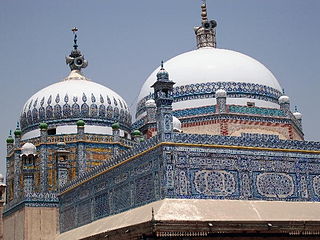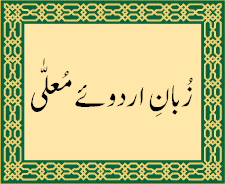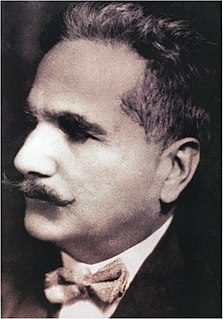
Khwaja Ghulam Farid Korejo or Khwaja Farid (1845–1901) was a 19th-century Saraiki Sufi poet. He was a scholar and writer who knew several different languages. He belonged to Chishti–Nizami Sufi order. He was born in and died at Chachran town and was buried at Mithankot, Punjab, Pakistan.

Hasrat Mohani was an Indian activist, Freedom Fighter in the Indian independence movement, ,founder leader of Indian Communist Party and a noted poet of the Urdu language. He coined the notable slogan Inquilab Zindabad in 1921. Together with Swami Kumaranand, he is regarded as the first person to demand complete independence for India in 1921 at the Ahmedabad Session of the Indian National Congress.

Abu Al-Asar Hafeez Jalandhari was a Pakistani Urdu-language poet who wrote the lyrics for the National Anthem of Pakistan. Another widely used name in Pakistan is Hafeez Jalandhari, a spelling shown in most English language Pakistani newspapers.

Hyderabadi Muslims are an ethnoreligious community of Dakhini Urdu-speaking Muslims, part of a larger group of Dakhini Muslims, from the area that used to be the princely state of Hyderabad, India, including cities like Hyderabad, Aurangabad, Latur, Gulbarga and Bidar.
Anjuman-i-Himayat-i-Islam or Anjuman-e-Himayat-e-Islam is an Islamic intellectual and social welfare organisation with branches both in India and Pakistan. It was founded in Lahore on 24 September 1884 in a mosque known as Masjid Bakan inside Mochi Gate, Lahore, by Khalifa Hameed-ud-Din.

Zafar Ali Khan, also known as Maulana Zafar Ali Khan, was a writer, poet, translator and a journalist who played an important role in the Pakistan Movement against the British Raj. Apart from Islamic religious sciences, he was well-versed in the latest theories of economics, sociology and politics, and for his erudition as well as methods, is generally considered to be "the father of Urdu journalism."

Jawed Sheikh is a Pakistani actor, director and producer.

Mirza Tahir Ahmad was the fourth caliph and the head of the worldwide Ahmadiyya Muslim Community. He was elected as the fourth successor of the founder of the community Mirza Ghulam Ahmad on 10 June 1982, the day after the death of his predecessor, Mirza Nasir Ahmad.

The Urdu movement was a socio-political movement aimed at making Urdu the universal language and symbol of the cultural and political identity of the Muslim communities of the South Asia during the British Raj. The movement began with the fall of the Mughal Empire in the mid-19th century, fuelled by the Aligarh Movement of Sir Syed Ahmed Khan. It strongly influenced the All India Muslim League and the Pakistan movement.
The Al-Hilal was a weekly Urdu language newspaper established by the Indian leader Maulana Abul Kalam Azad and used as a medium for criticism of the British Raj in India. The first issue came out on 13 July 1912. The newspaper also espoused the cause of the Indian independence movement and exhorted Indian Muslims to join the movement. The newspaper was shut down under the Press Act of 1914. "Al-Hilal, published in Calcutta, ushered in a new chapter in Urdu journalism and immediately appealed to Muslims in the city".

The Nigar Awards are presented in an annual award show to recognize outstanding achievement in Pakistani cinema. The honors are awarded by Nigar Magazine. The annual presentation ceremony features performances by prominent artists. The first Nigar Awards ceremony was held in 1957, to honor the accomplishments of Pakistani cinema for the year 1956. In 2002, following the 46th Annual Nigar Awards, Nigar Magazine announced its discontinuation of the awards due to the collapse of the Pakistani cinema industry. After a 15-year hiatus, with the revival of Pakistani cinema, the 47th Nigar Awards were announced to be held on 16 March 2017 in Karachi.

The Review of Religions is an English-language comparative religious magazine published monthly by the Ahmadiyya Muslim Community. Regularly in print since 1902, it is one of the longest running Islamic periodicals in English. It has been described as the main publication of the Ahmadiyya movement in the language and as a valuable source material for information on the geographical expansion of Ahmadi activity. The magazine was launched by Mirza Ghulam Ahmad with the aim of conveying an accurate understanding of Islamic teachings across the English-speaking world and dispelling misconceptions held against the faith. The articles, however, typically comprise distinctly Ahmadi perspectives. In addition to the English edition published from London, the magazine currently publishes separate quarterly editions in German, French and Spanish.

Sir Muhammad Iqbal, widely known as Allama Iqbal was a poet, philosopher and politician, as well as an academic, barrister and scholar in British India who is widely regarded as having inspired the Pakistan Movement. He is called the "Spiritual Father of Pakistan." He is considered one of the most important figures in Urdu literature, with literary work in both Urdu and Persian.

The Grand Mufti of Jerusalem is the Sunni Muslim cleric in charge of Jerusalem's Islamic holy places, including the Al-Aqsa Mosque. The position was created by the British military government led by Ronald Storrs in 1918. Since 2006 it has been held by Muhammad Hussein.

Lim Cheol, better known by his stage name DinDin, is a South Korean rapper and a television personality.

Dunia: Into a New World is a South Korean television entertainment program starring Yunho, Jung Hye-sung, Luda, Kwon Hyun-bin, Sam Okyere, Don Spike, Koo Ja-sung, Hansel, Austin Kang, and DinDin. Season 1 aired on MBC Sundays at 18:45 (KST), beginning on 3 June and ended on 23 September 2018.














